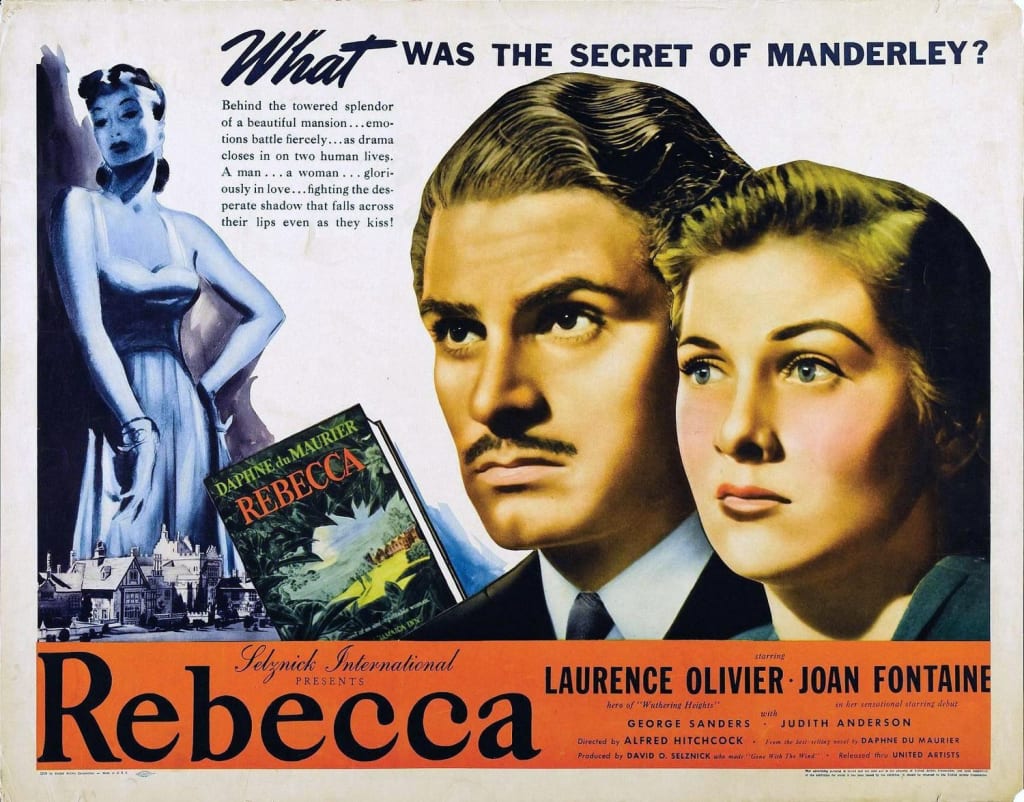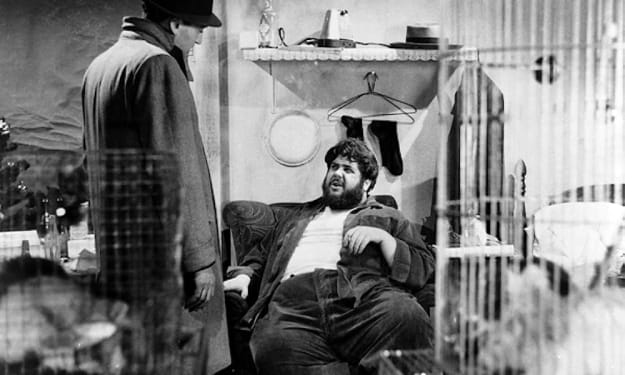
"I have always said Englishmen have strange tastes. You certainly have your work ct out for you as mistress of Manderley. Frankly my dear, I can't see you doing it. You haven't the experience, you haven't the faintest idea what it means to be a great lady." --Mrs. Van Hopper to the second Mrs. De Winter.
Rebecca is based on a novel by Daphne DuMaurier and it's a fairly straightforward tale for something Alfred Hitchcock decided to turn into a motion picture. It has a Wicked Queen (in the form of Mrs. Danvers, demoted in this life's role to the role of a servant), and a damsel in distress (at least emotionally). It features a fairy tale prince who the audience may suspect of being Bluebeard, and a young jackanapes, blackguard, scoundrel in the form of Rebecca's cousin and implied incestuous LOVER, "Favell" (played by George Sanders as an arrogant, sleazy, if rather amusing knave). The film begins with Olivier trying to cast himself off a cliff's edge, and Fontaine (never properly named in the film, except as the "Second Mrs. de Winter) managing to stop him. Fontaine's character is a paid traveling companion of the cruel, obnoxious, classist Mrs. Van Hooper (Florence Bates), who is alternately outgoing and friendly, and brutally cruel.
They later meet Maxim de Winter (Laurence Olivier) while on vacation, and it is discovered he's a wealthy man, owning the private estate of Manderley in the English countryside. Romancing Fontaine, he eventually impulsively asks for her hand in marriage, which infuriates the phony Mrs. Van Hopper, who seethes brutally and reminds Fontaine of her position in the British class hierarchy. It's one, she assures her, she can never shrug away. Be that as it may, she marries Maxim, and returns to Manderley, where she is greeted with icy cold aplomb by Mrs. Danvers (the regal Dame Judith Anderson, here a ghost from a Victorian novel in the flesh, cutting an impressive, dour, and unsmiling figure in her ankle-length black dress and done-up in a tight bun hair).
Danvers makes her dislike of Fontaine quite apparent, treating her coldly, and comparing her with the late Rebecca, who died "in a boating accident." Danvers was particularly devoted to Rebecca, and an implied lesbian relationship was forcibly cut, per the sensibilities of the era, by the official board of censors or whatever. Oh well. Times change.
Fontaine is living in the shadow of the dead, woman, under the sneering watchful eye of the servants, who see her as an upstart golddigger trying to replace their mistress. Maxim begins to act more and more strangely, a man with a disturbed and disturbing undercurrent of violent brutality lurking beneath the cool, upper-crust British exterior. He becomes infuriated if Fontaine mimics or reminds him of Rebecca in ANY way, and when the wicked queen embodied by Mrs. Danvers suggests Fontaine dress in a costume Rebecca was wearing before she "drowned on a boat," Maxim nearly has an aneurysm. Later, Danvers tries to coax Fontaine into jumping from a balcony.
Scene from REBECCA (1940)
There's wickedness a plenty afoot her, my dear Watson (who is here, in the alternate form of actor Nigel Bruce, an actor mostly cast with Basil Rathbone in old Sherlock Holmes movies of the period), and the final denouement comes in the form of the scurrilous Favell, who was sleeping with Rebecca, and who stoops to attempt blackmail--but, then, what DID happen on that boat in which Rebecca drowned? What is the ugly secret lurking beneath the surface of polite, aristocratic English society? The film suggests contamination, a cross-pollination between classes bringing up, dredging up, as if from the bowls of a sunken vessel, the ugly, corrupt face of civil tea-sipping society, the mask ripped away from the Ruling Class visage to reveal hypocrisy, dark, broiling passions, and even murder. But is this the result of social climbers, Rebecca, and maybe Fontaine, corrupting, as it were, the pure spiritual essence or presence of the Blue Bloods? The film presents an undercurrent of class resentment, envy, and hidden hypocrisy in a manner that is ambiguous. No wonder this film was so popular with the British public.
The film builds to a surprising conclusion, one that does not morally exculpate Maxim. In the end, like a fairy tale or gothic ending, the Evil is destroyed, But still, the haunted sense of the plight of these character's existences is felt keenly. They are living with ghosts that must be laid to rest, and possessed by the cold, troubled structures of their stations.
Directed by Hitchcock, who, by the way, went loggerheads with producer David Selznick, who wanted a very different film. Hitchcock shot "in camera", to avoid anyone reediting his picture. Selznick did it anyway.
Just a bit of trivia. Don't murder me for it.
Rebecca (1940) Trailer
About the Creator
Tom Baker
Author of Haunted Indianapolis, Indiana Ghost Folklore, Midwest Maniacs, Midwest UFOs and Beyond, Scary Urban Legends, 50 Famous Fables and Folk Tales, and Notorious Crimes of the Upper Midwest.: http://tombakerbooks.weebly.com






Comments (2)
Excellent review as always. I love old films so this one is going on my must watch list. If I may get some clarification. On you comments about an "implied incestuous" relationship and an "implied lesbian" relationships. Are these observations actually implied in the movie. Or are these your perception of possible "implications".
Great movie, & your review is more than equal to the task.